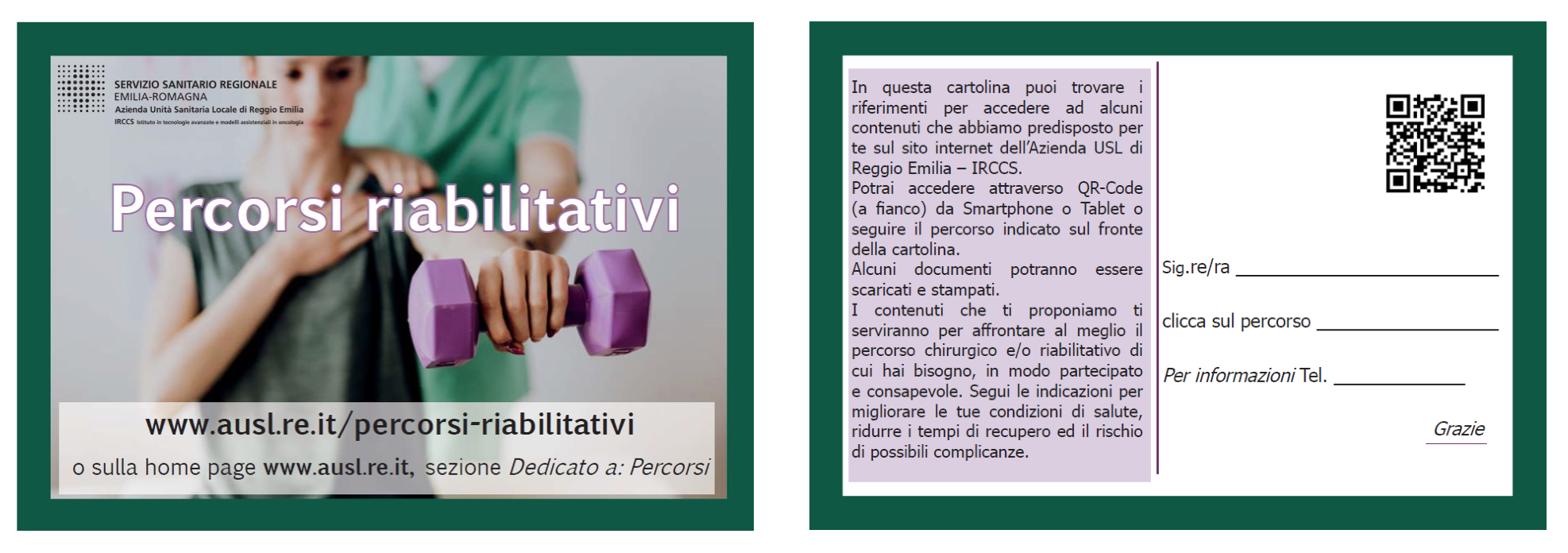Educazione terapeutica in seguito a chirurgia al seno. Sviluppo di supporto informativo audiovisivo.
Therapeutic education after breast surgery: implementation of audio-visual informational support.
Introduction
Therapeutic education is an essential element in all peri-operative stages and are key for patient engagement when administering self-care programs. Existing literature clearly states that an informed participation on behalf of patients during the course of treatment reduces the risk of complications, shortens recovery time, and consequently optimizes the use of healthcare resources [1,2].
At Azienda USL-IRCCS of Reggio Emilia, the “Breast-PDTA” (Therapeutic Diagnostic Care Path) involves structured therapeutic educational interventions led by both nursing staff and physiotherapists. This is often done both verbally, by giving routine notions on standard care, and with pamphlets and brochures.
PDTA monitoring data has on average 450 cases/year. Unfortunately, less than 65% of patients participate in therapeutic education group sessions led by PTs. Based on patients’ feedback, we created an audiovisual support to facilitate the therapeutic and educational process.
Methods
At first, we collected and reviewed the material already available at the services involved in the Breast-PDTA of our Institution and on The Web. Then, we conducted a focus group involving women previously treated for breast cancer according to the Breast-PDTA. The sample was recruited voluntarily by local patient associations. Data collection and analysis was conducted according to the methodology for qualitative studies. Based on the information on patient needs gathered via the focus group, a multi-professional group created the storyboard of the audiovisual material. This was created to be also used at other institutions in Emilia-Romagna for the years to come.
Results
The qualitative survey highlighted the users’ needs for additional information and more practical suggestions on how to become more self-sufficient including everyday activities especially in the immediate postoperative period, when exercising and during job-related activities. Users stated they would prefer to receive this information during the pre-surgical stage, rather than after surgery when issues related to surgical wound management and drainage may arise.
An in-depth analysis of available materials revealed a large but haphazard informational support available in PDF format. However, this information is difficult to access for both professionals and patients alike. All available information was now reordered onto a single internet page that can be reached by a link or a QR-Code (See Figure). The storyboard has been created and the audiovisual support is scheduled to be published in the fall of 2023 on the same webpage.
Discussion and Conclusion
The focus group revealed a partial discrepancy between the content put forward by the healthcare professionals and the real informational needs of the users, who were primarily interested in being self-sufficient in their ADLs, addressing the potential need for assistance, and wished to resume physical exercise and job-related activities.
The new audiovisual support does not replace the role of health professionals in the educational process. On the contrary, it can empower the professionals’ role by freeing up time to devote to listening to patients. This may help women become more aware and prepared to face the therapeutic process, right from the pre-surgical stages.
The reorganization and improvement of the existing information on a single webpage is consistent with the user-friendly digitization process the healthcare system is currently undergoing. The reorganization of material and audiovisual publication will be the subject of future analysis as part of PDTA monitoring.
REFERENCES
- Gyawali B, Bowman M, Sharpe I, Jalink M, Srivastava S, Wijeratne DT. (2023) A systematic review of eHealth technologies for breast cancer supportive care. Cancer Treatment Reviews. 2023; 114: 102519
- Singleton AC, Raeside R, Hyun KK, Partridge SR, Di Tanna GL, Hafiz N, Tu Q, Tat-Ko J, Sum SCM, Sherman KA, Elder E, Redfern J. Electronic Health Interventions for Patients with Breast Cancer: Systematic Review and Meta-Analyses. Journal of Clinical Oncology. 2022; 40: 2257-2270.

